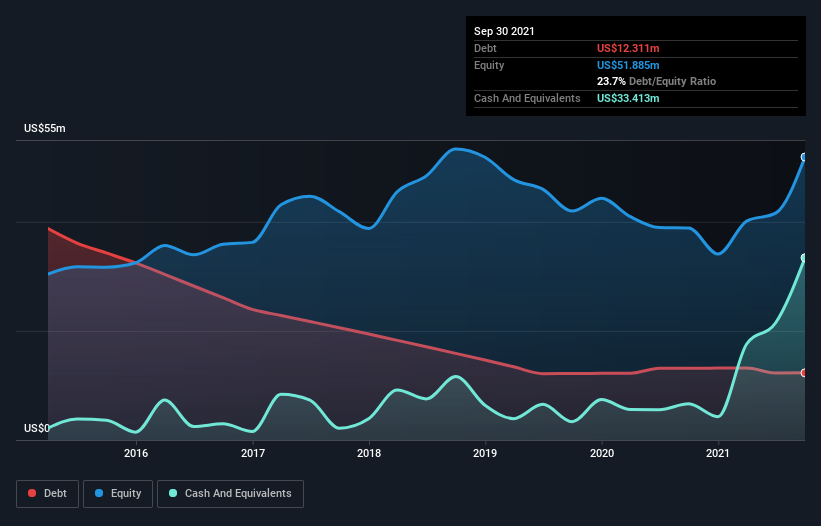Some say volatility, rather than debt, is the best way to think about risk as an investor, but Warren Buffett famously said that 'Volatility is far from synonymous with risk.' So it seems the smart money knows that debt - which is usually involved in bankruptcies - is a very important factor, when you assess how risky a company is. As with many other companies Ur-Energy Inc. (TSE:URE) makes use of debt. But the more important question is: how much risk is that debt creating?
What Risk Does Debt Bring?
Generally speaking, debt only becomes a real problem when a company can't easily pay it off, either by raising capital or with its own cash flow. If things get really bad, the lenders can take control of the business. However, a more frequent (but still costly) occurrence is where a company must issue shares at bargain-basement prices, permanently diluting shareholders, just to shore up its balance sheet. Of course, the upside of debt is that it often represents cheap capital, especially when it replaces dilution in a company with the ability to reinvest at high rates of return. The first thing to do when considering how much debt a business uses is to look at its cash and debt together.
Check out our latest analysis for Ur-Energy
What Is Ur-Energy's Net Debt?
The image below, which you can click on for greater detail, shows that Ur-Energy had debt of US$12.3m at the end of September 2021, a reduction from US$13.2m over a year. However, it does have US$33.4m in cash offsetting this, leading to net cash of US$21.1m.

How Strong Is Ur-Energy's Balance Sheet?
According to the last reported balance sheet, Ur-Energy had liabilities of US$6.43m due within 12 months, and liabilities of US$49.4m due beyond 12 months. Offsetting this, it had US$33.4m in cash and US$15.0k in receivables that were due within 12 months. So it has liabilities totalling US$22.4m more than its cash and near-term receivables, combined.
Given Ur-Energy has a market capitalization of US$295.0m, it's hard to believe these liabilities pose much threat. Having said that, it's clear that we should continue to monitor its balance sheet, lest it change for the worse. While it does have liabilities worth noting, Ur-Energy also has more cash than debt, so we're pretty confident it can manage its debt safely. When analysing debt levels, the balance sheet is the obvious place to start. But it is future earnings, more than anything, that will determine Ur-Energy's ability to maintain a healthy balance sheet going forward. So if you want to see what the professionals think, you might find this free report on analyst profit forecasts to be interesting.
Given its lack of meaningful operating revenue, Ur-Energy shareholders no doubt hope it can fund itself until it can sell some combustibles.
So How Risky Is Ur-Energy?
Statistically speaking companies that lose money are riskier than those that make money. And we do note that Ur-Energy had an earnings before interest and tax (EBIT) loss, over the last year. Indeed, in that time it burnt through US$12m of cash and made a loss of US$29m. With only US$21.1m on the balance sheet, it would appear that its going to need to raise capital again soon. Summing up, we're a little skeptical of this one, as it seems fairly risky in the absence of free cashflow. The balance sheet is clearly the area to focus on when you are analysing debt. However, not all investment risk resides within the balance sheet - far from it. Case in point: We've spotted 3 warning signs for Ur-Energy you should be aware of, and 2 of them shouldn't be ignored.
If, after all that, you're more interested in a fast growing company with a rock-solid balance sheet, then check out our list of net cash growth stocks without delay.
New: AI Stock Screener & Alerts
Our new AI Stock Screener scans the market every day to uncover opportunities.
• Dividend Powerhouses (3%+ Yield)
• Undervalued Small Caps with Insider Buying
• High growth Tech and AI Companies
Or build your own from over 50 metrics.
Have feedback on this article? Concerned about the content? Get in touch with us directly. Alternatively, email editorial-team (at) simplywallst.com.
This article by Simply Wall St is general in nature. We provide commentary based on historical data and analyst forecasts only using an unbiased methodology and our articles are not intended to be financial advice. It does not constitute a recommendation to buy or sell any stock, and does not take account of your objectives, or your financial situation. We aim to bring you long-term focused analysis driven by fundamental data. Note that our analysis may not factor in the latest price-sensitive company announcements or qualitative material. Simply Wall St has no position in any stocks mentioned.
About TSX:URE
Ur-Energy
Engages in the acquisition, exploration, development, and operation of uranium mineral properties in the United States.
Adequate balance sheet and fair value.
Similar Companies
Market Insights
Community Narratives




